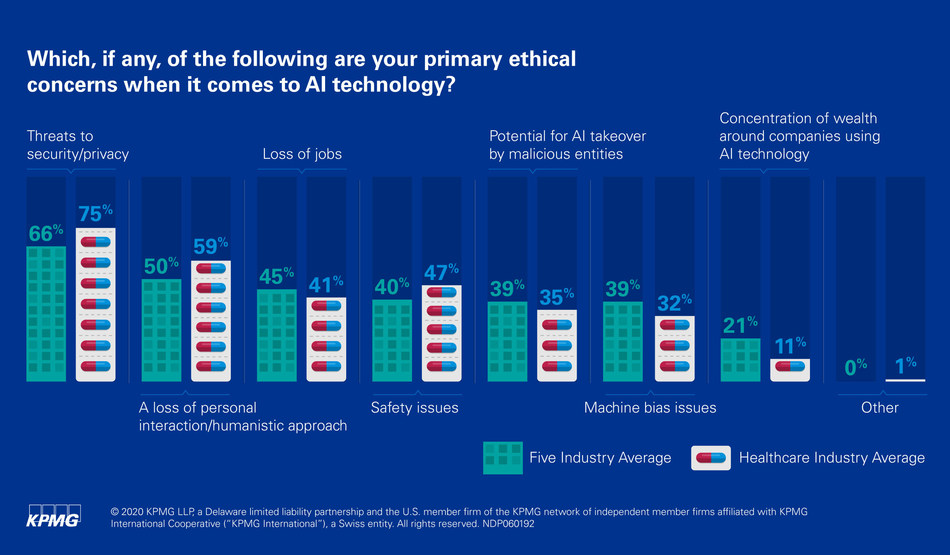Healthcare Trails Other Sectors In Developing AI Code of Ethics
Employee preparedness seen on par with retailing/consumer, lagging financial services, transportation and tech
While there is a great deal of hype and potential about artificial intelligence (AI) as a tool in medicine, only 36% of U.S. business decision makers in healthcare say their organizations have a code of ethics for this technology – the lowest among the five industries surveyed by KPMG LLP.
Another 21% of healthcare leaders with at least a moderate knowledge of AI said their organizations were in the process of developing a code of ethics for the use of AI, trailing the five-industry average of 31%.
Recommended AI News: Wilson Elser Announces Global Cyber Capabilities

“AI is going to have a vital, but complex, role in healthcare systems,” said Bharat Rao, KPMG’s data & analytics leader for healthcare & life sciences. “Studies are showing AI’s capabilities as a powerful tool to improve the accuracy of a clinical diagnosis and to support decision-making. It will transform how people work, whether they are delivering care or serving in an administrative capacity. However, there are a number of issues that need to be carefully considered, including how healthcare leaders tackle the ethical concerns and communications with patients.”
Recommended AI News: AiThority Interview With Adrian Leer, Managing Director – Triad Group Plc
When it comes to overall adoption and preparedness for the use of AI, the healthcare sector trailed technology, transportation, and financial services and was largely on par with the consumer/retail sector.
In terms of additional survey findings, of those responding:
- 75% agree that “patient data security/privacy is threatened by AI technology”
- 68% said employees within their organizations are aware of potential biases in AI, regarding gender and race
- 68% are confident in AI’s ability to diagnose patient illnesses/conditions
- 59% are concerned about the loss of personal interaction or humanistic approach
- 47% are concerned about safety issues, versus the five-industry average of 40%
- 32% cited machine bias as a primary ethical concern about using AI
AI’s implications for healthcare jobs
Only 43% of responding business decision leaders said their organizations’ employees were prepared for AI adoption, which was tied with the retail/consumer products sector and trailed the other sectors surveyed. Two-thirds of respondents (67%), however, said employees were largely supportive of AI and nearly two-thirds (65%) leaders agree with the statement that “employees at my company are open to the integration of AI.”
“The healthcare industry is confronted with an array of technological opportunities that can help providers differentiate themselves in the marketplace,” said Vince Vickers, KPMG healthcare technology leader. “AI will be important to health systems as they transform to become more efficient and boost quality. It will also be essential to their success in strengthening collaboration across different care settings, whether that’s hospitals, outpatient centers, physicians’ offices, home health or providers.”
Recommended AI News: AWS Acquires a Powerful Data Exploration and Visualization to Boost Python & R Integration

Comments are closed, but trackbacks and pingbacks are open.